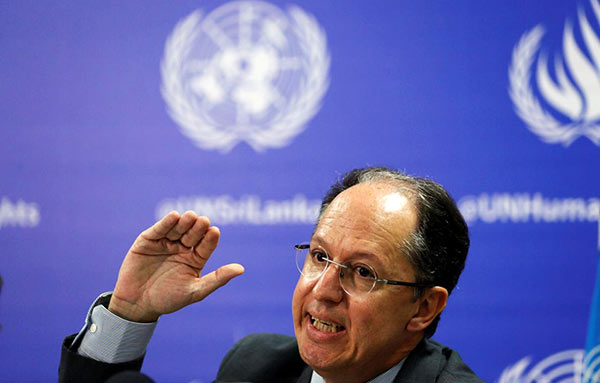U.N. says Sri Lanka’s delay in post-war reconciliation involves risks

Long delays in Sri Lanka’s post-war reconciliation is not without cost, and its government should implement measures to resolve outstanding issues, the United Nations said on Monday.
President Maithripala Sirisena’s government in 2015 agreed with the U.N. to investigate alleged war crimes in the final phase of a 26-year civil war. It then requested a two-year extension to fulfill that commitment.
Both sides in the conflict – the government military and the separatist Liberation Tigers of Tamil Eelam – were equally responsible for war crimes, according to the U.N.
The government has agreed to establish a special court to investigate the alleged crimes and return land occupied by the military in the north.
However, much of the process has been delayed by the government amid worries it will lose popularity among Sinhala Buddhists, Sri Lanka’s majority community, analysts say.
After a two-week fact-finding mission, U.N. special rapporteur Pablo de Greiff said such delays raise questions about the determination of the government to undertake a comprehensive transitional justice program.
“Long delays between the acknowledgment of obligations to establish transitional justice measures and the fulfillment of these involves risks: no one should be under the impression that waiting is a costless alternative,” he told reporters in Colombo after concluding his mission.
He also said the process has been increasingly ethnicized.
”As a result, transitional justice is represented as if it were essentially a threat to the majority community, of interest to one of the minorities only – and all others left at the margins,” he said.
Many Sri Lankans oppose foreign involvement, and supporters of former president Mahinda Rajapaksa believe the U.N. resolution on the need to investigate war crimes aims to punish the military unfairly.
The international community has urged a judicial process to hold out a realistic prospect of punishment for senior figures in Rajapaksa’s government and military, as well as Tamil Tiger rebels, who waged a bitter final battle in which the U.N. has said up to 40,000 people were killed.
(Reuters)
Latest Headlines in Sri Lanka
- Sri Lanka, India in talks to strengthen defence ties February 12, 2025
- Sri Lanka Police announces largest-ever transfer of 139 Officers-in-Charge February 12, 2025
- Sri Lanka to implement new EPF management system February 11, 2025
- 17 Sri Lanka Police officers discharged from service over drug use February 11, 2025
- Yoshitha Rajapaksa and Daisy Forrest named as suspects in money laundering case February 11, 2025



This is not the UN’s view.
This is Pablo de Greiff’s view; he is just another servant of the UN collecting millions of UN Funds as salary.
Dear Pablo, congratulations, you got a free UN sponsored trip to our emerald island and enjoyed its hospitality for 5 days. At the end of it, you decided to throw shit on us. Good on you mate, hope you continue screwing UN for many more years but don’t think and act as if we are stupid.
A fundametal premise that the UN ad its agencies should reconcile is the legitimacy of prabhakaran and the LTTE. Those who advocate never recognized LTTE as a popular movement. Whatever support that they got from those were covert designed more to undermine the a succession of governments elected by a popular vote inclusive of the tamils in the north, south, east and west.
Further UN should recognise the fact that it is security forces that defends not only the soreignity of the nation but maintaining the political order. No country has really entertain the cynisism of the UN bigotry to demand as to how the defence system operates unless UN has a mandate to do so.
This guy Pablo de Greiff from Colombia is the least likely candidate to express any opinion on what is happening in south asia let alone in sri lanka. so any expression of his views should be considered dubious and dis missed accordingly.
UN is essentially an agency cobbled together with dollars pledged by the USA and us president when he last addressed the assembly demanded that UN should do more for peace than escalate conflict.
Pablo de Greiff since this guy from Colmbia should focus his attention to events taking place in southameriaca something he is familiar with